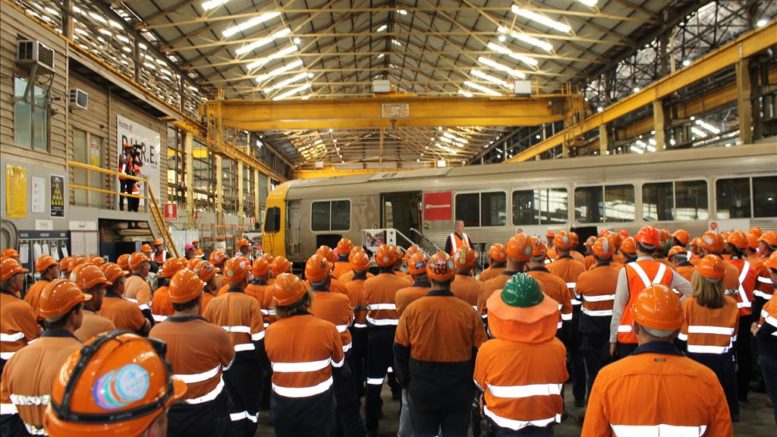The neoliberal assumptions that have held sway over economic policymaking for a generation must be abandoned, writes Senator Kim Carr
The US and China are at each other’s throats, disrupting global supply chains as the world struggles to produce the vital medical equipment it needs to fight the Covid-19 pandemic.
Economic nationalism, long scorned by self-righteous globalists, has suddenly become acceptable again.
For a generation, the globalists assumed that we could contract our sovereign capabilities in manufacturing to other nations because we would never face a situation such as the one we are in.
That blithe assurance has been exploded by the pandemic, and even some conservative politicians now talk about sovereign capability in manufacturing.
Their newfound interest in local manufacturing, however, casts doubt on their understanding of what is required to build a complex, advanced industrial economy.
The first-world lifestyle to which Australians are accustomed cannot be sustained by wallowing in the fantasy of what is essentially a third-world economy – a quarry and a beach.
It is wishful thinking to imagine that, after a bit of tinkering with government procurement to increase the supply of face masks and ventilators, we can go back to the way we were when the crisis is over.
The neoliberal assumptions that have held sway over economic policymaking for a generation must be abandoned.
The first-world lifestyle to which Australians are accustomed cannot be sustained by wallowing in the fantasy of what is essentially a third-world economy – a quarry and a beach.
If the government were serious about achieving sovereign capabilities in Australian manufacturing, it would start by reversing the decline of investment in research and development (R&D) over which it has presided since 2013.
It would withdraw a bill before the Parliament that would cut A$1.8 billion over four years from the R&D Tax Incentive, the most important measure linking the taxation and innovation systems.
No country can expand its advanced manufacturing base without forging the necessary collaboration between science and industry.
Science must be an essential part, not just an ally, in the industrial process, and the stark and sombre fact is that Australia has not been very good at this.
Among OECD countries, we are at the bottom of the pack when it comes to converting the world-class science that is done here into advanced manufacturing capabilities.
That is why we risk slipping even further beyond other industrial nations as the fourth industrial revolution, based on interactive machines and the so-called Internet of Things, transforms workplaces everywhere.
The Treasurer, Josh Frydenberg, and the Industry Minister, Karen Andrews have both spoken about increasing local production of ventilators and masks for obvious reasons: these items are in the news every day, and the shortage of them highlights the fact that we are in both a health and an economic crisis.
But Mr Frydenberg and Ms Andrews have not acknowledged that having a manufacturing sector capable of remedying the problem is not only a matter of there being factories capable of churning out the finished products.
Those factories depend on supply chains that include chemical and plastics industries, and on the existence of steel and aluminium smelters and other forms of metals production and processing.
All of those things, in turn, depend on the availability of skills in precision engineering, and on a research sector in which scientists adapt their skills and knowledge to the needs of industry.
The newfound interest in local manufacturing casts doubt on conservative politician’s understanding of what is required to build a complex, advanced industrial economy.
All of that must be in place before we can begin to have an assured supply of essential medical equipment and, as those who have followed the fortunes of the manufacturing sector will know, many of these basic industrial capabilities are in decline in Australia.
Most of the measures Labor established when it was in office to foster R&D and innovation have been axed or defunded under the coalition government, which has cut a net A$2 billion from science, research and innovation programs.
Business investment in R&D has reflected the lack of government initiative, and has fallen by more than 12 per cent since 2013, the Department of Industry, Science, Energy and Resources told a Senate estimates committee in March.
The government’s plan to cut the Research and Development Tax Incentive, the most important item in the nation’s innovation tool box, has been opposed by nearly all major stakeholders, especially large manufacturing firms that conduct the bulk of private sector R&D.
In submissions to a Senate inquiry, they argued that it would drive many firms to take their R&D offshore.
If the Treasurer really wants to revive Australian manufacturing, he should redraft the bill to scrap the cut, and include instead a proposal by the so-called “three Fs” review of the Australian innovation system.
In their review released in 2016, Chief Scientist Alan Finkel, former Chair of Innovation Australia Bill Ferris, and former Treasury Secretary John Fraser called for a premium rate of the Incentive to be available to companies that engage in collaboration with universities and research agencies.
It is the sort of measure that is put in place by the governments of nations with progressive, innovative and complex industrial economies.
And it is a measure Australia should adopt, to begin a revitalisation of our manufacturing sector that will ensure we have the sovereign capabilities to meet future crises.

Credit: Kym Smith
Kim Carr is a Labor Senator for Victoria and a former Minister for Innovation, Industry, Science and Research. He is chair of the Australian parliament’s Legal and Constitutional Affairs References Committee.




